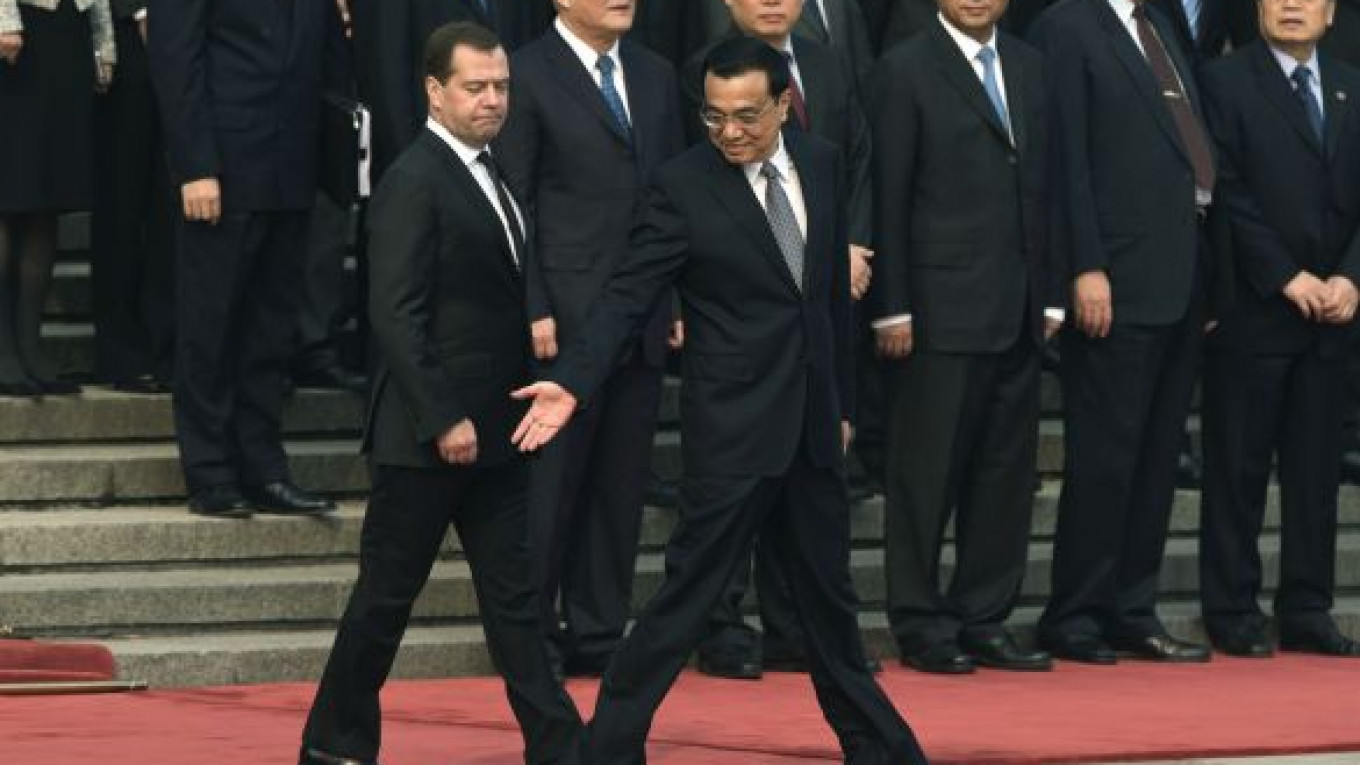Prime Minister Dmitry Medvedev on Tuesday called for greater direct investment between Russia and China, on a visit to Beijing that resulted mostly in trade and banking deals.
An increase in direct investment would take economic ties up a notch from their current heavy reliance on Chinese lending facilities and bilateral exchange of goods.
Medvedev also commended some of China's severe anti-corruption measures, spoke of his past life as a weight lifter and presented a collection of his own photographs to a Chinese man who asked him a particularly interesting question.
“We have to pay attention to investment because things are not so good in that area,” Medvedev said in a joint news conference with Chinese Premier Li Keqiang. “We expressed the wish to strengthen investment cooperation, and primarily direct investment into the economies of both countries.”
The leaders spoke after attending signing ceremonies for a raft of deals earlier Tuesday.
In what appeared to be an agreement of the sort touted by Medvedev, Metals of Eastern Siberia Corporation, part of the Moscow-based multi-profile Metropol Group, signed a contract with China Nonferrous Metal Industry's Foreign Engineering and Construction Company. Under the terms of the agreement, the Chinese company will design and build an ore processing plant in Buryatia, to the east of Lake Baikal, at an estimated cost of up to $1.5 billion. The Chinese company will own 50 percent of the facility, according to a preliminary deal signed earlier this year.
Also Tuesday, Russia's development bank, VEB, agreed to borrow $1.9 billion from two Chinese lenders.
Under one of the deals, VEB will borrow $800 million from China Development Bank to fund a project to build office and retail space at the site of Moscow's former Slava wristwatch factory near Belorussky Station.
Under another deal, VEB will take out a $400 million loan from the same Chinese bank to finance the construction of a power plant in Kazakhstan.
In a third agreement, VEB secured a $700 million line of credit from the Export-Import Bank of China for purposes that the parties did not disclose.
In a separate deal, billionaire Oleg Deripaska, president of EN+, signed a strategic cooperation agreement with Cao Peixi, president of state-owned power generation company China Huaneng Group.
Rosneft also agreed to supply oil to the refinery that it wants to build in China with China National Petroleum Corporation, or CNPC. Private natural gas firm Novatek signed a deal defining the basic terms under which CNPC will buy natural gas from the planned Yamal LNG plant in the Arctic.
Aside from the business agenda, Medvedev held an online question-and-answer session with an audience defined by Russian news agencies as "Chinese Internet users."
He said Russian officials closely watched China's anti-corruption efforts, which involve death sentences to wrongdoers. But some of the harsh measures were not acceptable in Russia, he added.
"You have experience, which is based on Chinese traditions and is interesting," Medevedev said in response to one question, Interfax reported. "I have to confess that a number of measures that you employ are very harsh and unacceptable under our legislation. But I think that these kind of measures bear fruit and hit home."
While sweeping aside the option of executions for corruption-related offenses, Medvedev lamented the poor record of combating the phenomenon in Russia.
"Of course, I cannot say that we have turned the situation around and are now OK," he said. "We will need an enormous amount of effort in the future to rectify this situation."
Answering another question, Medvedev said both the Russian and Chinese governments would seek to further streamline visa rules to ease tourist exchanges.
Medvedev also leaked some personal information. When asked about his hobbies, Medvedev said he liked sports, books and taking pictures. He added that he often takes snapshots through the window of his government car or other vehicles during work-related trips because of his busy schedule.
About sports, he said he used to do weight lifting for a short while and, for a longer period, he was involved in rowing, a sport that he still tries to follow.
"As of now, I do neither of those," he said.
His current athletic activities are swimming and cycling, which he tries to do every day, he said.
Wrapping up the conference, Medvedev, at the urge of the host, chose the question he liked most. That was a question about ancient Chinese philosopher Lao Tzu and Chinese culture. The exact question and Medvedev's full answer were not reported immediately Tuesday. Medvedev did recall, however, that both he and his Chinese counterpart had quoted Lao Tzu's maxim advising more meaningful conversations during the talks earlier.
Medvedev gave a book of his photographs to the Chinese man who put the question to thank him for asking it.
"I hope he will take a look, and, maybe, like something," Medvedev said.
Contact the author at [email protected]
A Message from The Moscow Times:
Dear readers,
We are facing unprecedented challenges. Russia's Prosecutor General's Office has designated The Moscow Times as an "undesirable" organization, criminalizing our work and putting our staff at risk of prosecution. This follows our earlier unjust labeling as a "foreign agent."
These actions are direct attempts to silence independent journalism in Russia. The authorities claim our work "discredits the decisions of the Russian leadership." We see things differently: we strive to provide accurate, unbiased reporting on Russia.
We, the journalists of The Moscow Times, refuse to be silenced. But to continue our work, we need your help.
Your support, no matter how small, makes a world of difference. If you can, please support us monthly starting from just $2. It's quick to set up, and every contribution makes a significant impact.
By supporting The Moscow Times, you're defending open, independent journalism in the face of repression. Thank you for standing with us.
Remind me later.






